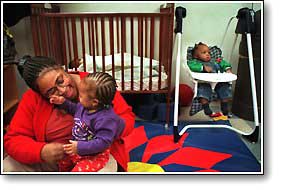SAN FRANCISCO --
SAN FRANCISCO - Behind the sweet, bright-eyed face of an infant
listening to a parent's "baby talk" is a sophisticated analytical
machine sifting through every sound for patterns and
meaning.
The machine may even be equipped with perfect pitch
-- a trait rare in older humans -- to help the baby acquire subtle
but key knowledge about sound.
This picture, painted Monday
by scientists, sheds new light on
how infants may use several mechanisms to learn a language --
perhaps the most complex goal a human being can achieve.
"All
these mechanisms are working at the same time," said Michael Brent,
one of the researchers. Brent is a computer scientist at Washington University who
studies natural language learning.
The scientists gave their reports in San
Francisco at the annual meeting of the American Association for the
Advancement of Science, which ends today.
Their findings
contribute to an emerging picture of language development in which
infants give different weight to any of several learning mechanisms
at different times.
Besides the intrinsic interest in how
humans learn language, the research is important because it may fuel
advances in speech-recognition
technology in computers. Also, it may help scientists in the field of "artificial
intelligence" design computers that can analyze the grammar of an
unknown language.
To understand this research, it's helpful
to keep in mind that babies encounter a complicated and confusing
world of sights, sounds, textures and other goings-on. One challenge
they face is extracting meaningful information from what appears to
them to be a wild symphony of syllables, words and
sentences.
For example, a baby must figure out where the
words in a long stream of speech
begin and end.
The Washington University work focused on how
babies under 15 months begin to sort this out. Brent and his
colleagues found that the short, vibrant words of parental "baby
talk" are key.
"Mothers instinctively use short utterances,"
said Brent, who conducted the work with Jeffrey Siskind of the NEC
Institute of Princeton, N.J.
"Short utterances, especially
single words, help speed up recognition of speech and discovery of new words," he
said.
Brent's team recorded more than 200 hours of mothers'
baby talk to their children when the kids were between nine and 15
months old. They traced what the babies had learned and found that
many of the words came from the short utterances.
"The first
words children tend to learn are words their mothers speak in
isolation, suggesting that such isolated words may form a foundation
for early vocabulary learning," he said.
The Washington
University work is important because it shows that babies learn many
individual words before they start to pull them out of long strings
of language.
This challenges an idea that gained prominence
in the 1990s that babies learn words as part of long strings of
words.
Babies pick words out of long strings later in
development, Brent said.
At the University of Wisconsin at
Madison, psychologist Jenny Saffran has found that 8-month-old
babies are "little statisticians," as she put it. In other words,
they are skilled at tracking how often certain sounds follow other
sounds in the language.
As they soak up sounds like sponges,
they apply that statistical knowledge to their efforts to
distinguish words from strings of sounds.
For example, by
hearing the talk of parents, a baby eventually learns that the
letter "t" often follows the letter "p" in English words. This helps
the baby know that the phrase "pretty baby" can be separated into
two distinct words.
Saffran also found that a baby's brain is
wired to recognize perfect pitch. That's the ability to identify a
musical note without the benefit of a reference point, an ability
rare even among musicians.
This ability shows how infants and
adults process sounds differently.
"What's interesting here
is we (as infants) may not have dedicated hardware just for
language," she said. "The structure is probably general to many
complex forms of learning, including music."
Perfect pitch
slips away from humans as they grow older, probably because it's no
longer that useful as a learning tool, Saffran said. But while
infants have it, this ability no doubt helps them learn subtle
differences between similar-sounding words, she said.
Do
babies prefer a mother's voice to a father's? Scientists haven't studied that, Saffran
said. But, she added, babies do prefer higher-pitched
voices.
In view of the findings, should parents speak more
short utterances than long phrases when talking to their babies? The
scientists don't know, but they
suggested doing what comes naturally.
"Don't worry about how
you speak to your baby," Brent advised. Without trying, parents who
speak to their children will supply plenty of short and long
utterances.
"The important thing," he said, "is just to speak
to them."
 At a scientific conference
in San Francisco Monday, Washington University Professor
Michael Brent and others presented new research on how babies
learn to talk. Click photo for a larger image. At a scientific conference
in San Francisco Monday, Washington University Professor
Michael Brent and others presented new research on how babies
learn to talk. Click photo for a larger image.
(Andrew
Cutraro/P-D)
|







